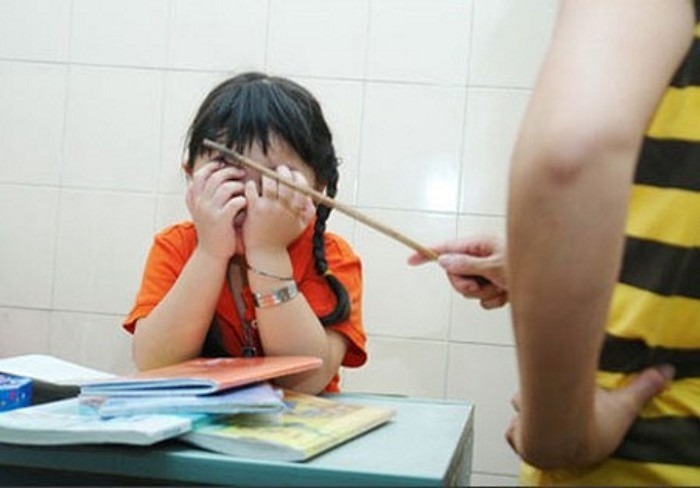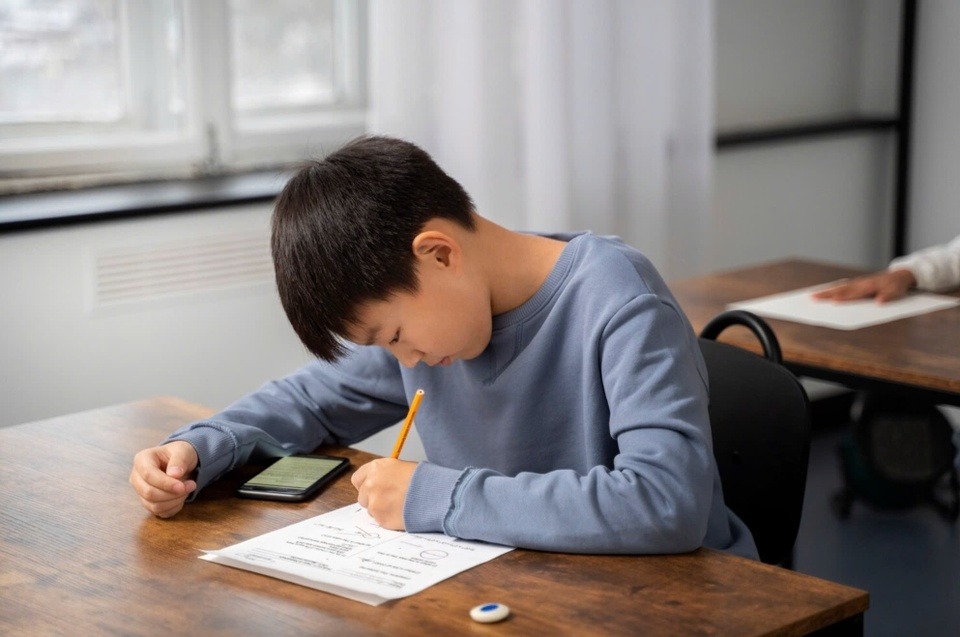GĐXH - Every child can get bad grades. For children who experience this situation frequently, they will have more difficulties.
Instead of criticizing, parents should help their children overcome this stage, rebuild their confidence and find more effective ways to learn, according to Tutor Doctor.
1. Keep calm
According to education experts, parents scolding and criticizing children for getting bad grades will not encourage them to improve.
On the contrary, it makes children both pressured by their grades and stressed when having to share their learning progress with their family.
If you feel like you can't keep calm when your child gets a bad grade, take a break from the conversation, think for yourself, or do something else like cleaning the house or cooking.
By delaying the conversation, you will regain your composure to consider the problem, avoiding saying negative words that affect the child.

Instead of getting angry, scolding or comparing your child with other children, parents should help them overcome their obsession with grades. Illustration photo
2. Talk to your child
For many children, school and grades are not a top priority. Some may be dealing with stress or pressure from schoolwork that is preventing them from performing at their best.
So, if your child gets bad grades or fails an exam, listen to him or her instead of criticizing or comparing him or her with other children.
A gentle approach from parents will help children not to be obsessed with grades or afraid when talking about exams. This also helps children feel secure and focus on studying better.
3. Remind your child that bad grades aren't everything.
First, parents need to reassure children that no one is perfect and bad grades do not make them failures.
Grades are just one measure of success, and some people succeed in different ways. At the same time, parents should try to recognize and praise the things their children do well.
Redirecting the conversation to areas where your child is doing well will help your child focus on the positives and academic progress instead of dwelling on the negative.
4. Identify the problem
Once you have calmed down, sit down and discuss the learning issue with your child.
In a relaxed and open manner, encourage your child to share the reasons for his poor academic performance.
There are many reasons why children fail. A class that is too difficult can be the reason, as sometimes children are placed in a class or learning group that is more advanced and cannot keep up with their peers.
Children who do not do homework can also suffer from poor learning due to lack of review activities.
Children miss too much school so they cannot keep up with the lessons in class. Or children have psychological problems such as stress when having to take tests, competitive pressure in studying leading to a lack of alertness when doing the test.

Once you have calmed down, sit down and discuss the learning issue with your child. Illustration photo
5. Motivate your child
No one wants to do something they don't like and even if they try to do it, but in an involuntary way, they can't get good results.
Forcing your child to study for higher grades will not work. Helping your child to be motivated to study is the best solution.
When children are motivated to learn, their grades will definitely improve.
6. Recognize effort over results
Bad grades can leave children frustrated and depressed.
At this point, parents should show their children that you truly respect their efforts throughout the process, even when the results are not as expected.
You can tell your child that they did well and to think of some different strategies to try next time. This way, instead of getting discouraged, your child will regain confidence and improve in a positive way.
7. Talk to the teacher
Most children do not want their parents to talk to their teachers, but discussing learning problems with teachers is necessary.
Once you have identified the problem, you may think of many solutions, but it is still advisable to consult with teachers who are directly monitoring your child's learning progress.
You can ask the teacher what your child should do or improve to improve their learning.
Additionally, by talking with teachers, parents can discover issues going on in the classroom that impact their child's learning.
For example, children play with a group of lazy friends who often lose focus when studying. From there, both sides can discuss measures to help children change.

Most children do not want their parents to talk to their teachers, but it is necessary to discuss learning problems with teachers. Illustration photo
8. Find more help for your child
There are many ways to help children improve their academic performance, and one effective method is to seek outside help, such as a tutor.
Tutors can adjust teaching methods to suit each individual, helping children understand lessons faster and grasp knowledge better.
In addition to parents and teachers, children also receive regular encouragement and support, helping them gain more confidence in their abilities.
Source: https://giadinh.suckhoedoisong.vn/cha-me-lam-duoc-8-dieu-nay-khi-con-bi-diem-kem-se-giup-tre-tim-lai-duoc-su-tu-tin-va-kha-nang-hoc-tap-172250117152725424.htm




![[Photo] National Assembly Chairman Tran Thanh Man receives United Nations Secretary-General Antonio Guterres](https://vphoto.vietnam.vn/thumb/1200x675/vietnam/resource/IMAGE/2025/10/25/1761390815792_ctqh-jpg.webp)
![[Photo] Prime Minister Pham Minh Chinh and United Nations Secretary-General Antonio Guterres attend the Press Conference of the Hanoi Convention Signing Ceremony](https://vphoto.vietnam.vn/thumb/1200x675/vietnam/resource/IMAGE/2025/10/25/1761391413866_conguoctt-jpg.webp)

![[Photo] Prime Minister Pham Minh Chinh receives United Nations Secretary-General Antonio Guterres](https://vphoto.vietnam.vn/thumb/1200x675/vietnam/resource/IMAGE/2025/10/25/1761390212729_dsc-1484-jpg.webp)




























![[Photo] General Secretary To Lam meets with General Secretary and President of Laos Thongloun Sisoulith](https://vphoto.vietnam.vn/thumb/1200x675/vietnam/resource/IMAGE/2025/10/25/1761380913135_a1-bnd-4751-1374-7632-jpg.webp)











































































Comment (0)